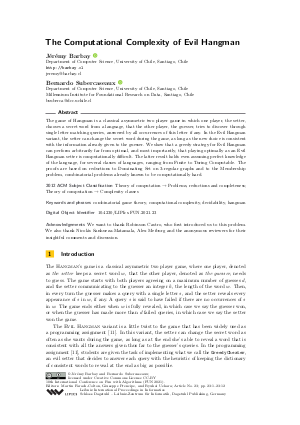The Computational Complexity of Evil Hangman
Authors
Jérémy Barbay  ,
Bernardo Subercaseaux
,
Bernardo Subercaseaux 
-
Part of:
Volume:
10th International Conference on Fun with Algorithms (FUN 2021)
Part of: Series: Leibniz International Proceedings in Informatics (LIPIcs)
Part of: Conference: International Conference on Fun with Algorithms (FUN) - License:
 Creative Commons Attribution 3.0 Unported license
Creative Commons Attribution 3.0 Unported license
- Publication Date: 2020-09-16
File

PDF
LIPIcs.FUN.2021.23.pdf
- Filesize: 0.56 MB
- 12 pages
Document Identifiers
Subject Classification
ACM Subject Classification
- Theory of computation → Problems, reductions and completeness
- Theory of computation → Complexity classes
Keywords
- combinatorial game theory
- computational complexity
- decidability
- hangman
Metrics
- Access Statistics
-
Total Accesses (updated on a weekly basis)
0Document
0Metadata
Abstract
The game of Hangman is a classical asymmetric two player game in which one player, the setter, chooses a secret word from a language, that the other player, the guesser, tries to discover through single letter matching queries, answered by all occurrences of this letter if any. In the Evil Hangman variant, the setter can change the secret word during the game, as long as the new choice is consistent with the information already given to the guesser. We show that a greedy strategy for Evil Hangman can perform arbitrarily far from optimal, and most importantly, that playing optimally as an Evil Hangman setter is computationally difficult. The latter result holds even assuming perfect knowledge of the language, for several classes of languages, ranging from Finite to Turing Computable. The proofs are based on reductions to Dominating Set on 3-regular graphs and to the Membership problem, combinatorial problems already known to be computationally hard.
Cite As Get BibTex
Jérémy Barbay and Bernardo Subercaseaux. The Computational Complexity of Evil Hangman. In 10th International Conference on Fun with Algorithms (FUN 2021). Leibniz International Proceedings in Informatics (LIPIcs), Volume 157, pp. 23:1-23:12, Schloss Dagstuhl – Leibniz-Zentrum für Informatik (2020)
https://doi.org/10.4230/LIPIcs.FUN.2021.23
BibTex
@InProceedings{barbay_et_al:LIPIcs.FUN.2021.23,
author = {Barbay, J\'{e}r\'{e}my and Subercaseaux, Bernardo},
title = {{The Computational Complexity of Evil Hangman}},
booktitle = {10th International Conference on Fun with Algorithms (FUN 2021)},
pages = {23:1--23:12},
series = {Leibniz International Proceedings in Informatics (LIPIcs)},
ISBN = {978-3-95977-145-0},
ISSN = {1868-8969},
year = {2020},
volume = {157},
editor = {Farach-Colton, Martin and Prencipe, Giuseppe and Uehara, Ryuhei},
publisher = {Schloss Dagstuhl -- Leibniz-Zentrum f{\"u}r Informatik},
address = {Dagstuhl, Germany},
URL = {https://drops.dagstuhl.de/entities/document/10.4230/LIPIcs.FUN.2021.23},
URN = {urn:nbn:de:0030-drops-127840},
doi = {10.4230/LIPIcs.FUN.2021.23},
annote = {Keywords: combinatorial game theory, computational complexity, decidability, hangman}
}
Author Details
Acknowledgements
We want to thank Robinson Castro, who first introduced us to this problem. We also thank Nicolás Sanhueza-Matamala, Alex Meiburg and the anonymous reviewers for their insightful comments and discussion.
References
-
Derek G. Corneil and Lorna K. Stewart. Dominating sets in perfect graphs. In Topics on Domination, pages 145-164. Elsevier, 1991.

-
Rod G. Downey and Michael R. Fellows. Fixed-parameter tractability and completeness II: On completeness for W[1]. Theoretical Computer Science, 141(1-2):109-131, April 1995.

-
Eliot D. Feldman and James C. Owings. A class of universal linear bounded automata. Inf. Sci., 6:187-190, 1973.

-
Jörg Flum and Martin Grohe. Parameterized Complexity Theory (Texts in Theoretical Computer Science. An EATCS Series). Springer-Verlag New York, Inc., Secaucus, NJ, USA, 2006.

-
P. Hall. On representatives of subsets. Journal of the London Mathematical Society, s1-10(1):26-30, January 1935.

-
John E. Hopcroft and Richard M. Karp. An $n^{5/2} $ algorithm for maximum matchings in bipartite graphs. SIAM Journal on Computing, 2(4):225-231, December 1973.

-
Richard M. Karp. Reducibility among combinatorial problems. In Complexity of Computer Computations, pages 85-103. Springer US, 1972.

-
Tohru Kikuno, Noriyoshi Yoshida, and Yoshiaki Kakuda. The np-completeness of the dominating set problem in cubic planer graphs. IEICE TRANSACTIONS (1976-1990), 63(6):443-444, 1980.

-
S.-Y. Kuroda. Classes of languages and linear-bounded automata. Information and Control, 7(2):207-223, June 1964.

-
Peter Linz. An Introduction to Formal Languages and Automata, Fifth Edition. Jones and Bartlett Publishers, Inc., USA, 5th edition, 2011.

-
Nick Parlante, Julie Zelenski, Keith Schwarz, Dave Feinberg, Michelle Craig, Stuart Hansen, Michael Scott, and David J. Malan. Nifty assignments. In Proceedings of the 42nd ACM technical symposium on Computer Science Education - SIGCSE quotesingle11. ACM Press, 2011.

-
Jan Arne Telle and Yngve Villanger. FPT algorithms for domination in biclique-free graphs. In Algorithms endash ESA 2012, pages 802-812. Springer Berlin Heidelberg, 2012.

- Wikipedia.org. Iverson bracket notation. https://en.wikipedia.org/wiki/Iverson_bracket. Last accessed on 2020-02-06.
